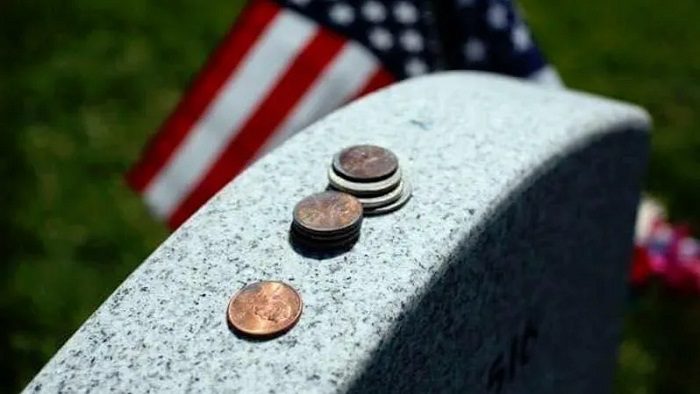
Why do people leave coins on gravestones? Coins are often left on gravestones as a sign of respect for the deceased or as a means of communicating with the dead. Moreover, it’s another tradition developed out of mythology and U.S. military culture, serving as a way to remember those who gave their lives protecting our nation from such a controversial war.
Meaning of Different Coins Left on Gravestones
While leaving coins may seem like a simple gesture, it is not as common as leaving flowers and candles on graves. Different coins are associated with different messages; meanings vary depending on the type of coin left and you can use each to convey a different sentiment. This is a common way to honor fallen comrades, especially around Memorial Day. The deceased soldier’s family can often be found visiting cemeteries in remembrance of their loved ones, and often they will find grave money there. Leaving coins on a headstone lets their family know they have been visited by someone special.
Coins on Military Graves
Putting coins on a headstone or at the grave of military members is meant to message the family of the deceased soldier that someone else has visited the grave to pay respect. Each type of coin has distinct meanings and signify small tokens of remembrance paid by those deceased soldier’s family and still living.
Moreover, coins on gravestones are not just tokens of appreciation; they are also a reminder of our shared history. They remind us of the sacrifices made by those who came before us and the countless lives lost in battle.
When we leave a coin on a gravestone, we honor not just the individual soldier but also the service of all men and women who have fought for our country. Coins on military gravestones are also a reminder that the lives of these individuals have not been forgotten and that they will always be honored.
Here is a simple breakdown of the meaning behind each type of coin for the military grave:
- Penny – A penny left at the tomb signifies that you visited. Despite not having a formal connection with the deceased, you respect their family and the service they have provided.
- Nickel – Leaving a nickel means you and the deceased soldier trained at boot camp together.
- Dime – A dime means you served with the deceased person in some capacity.
- Quarter – Finally, a quarter means you were with the deceased when they died.
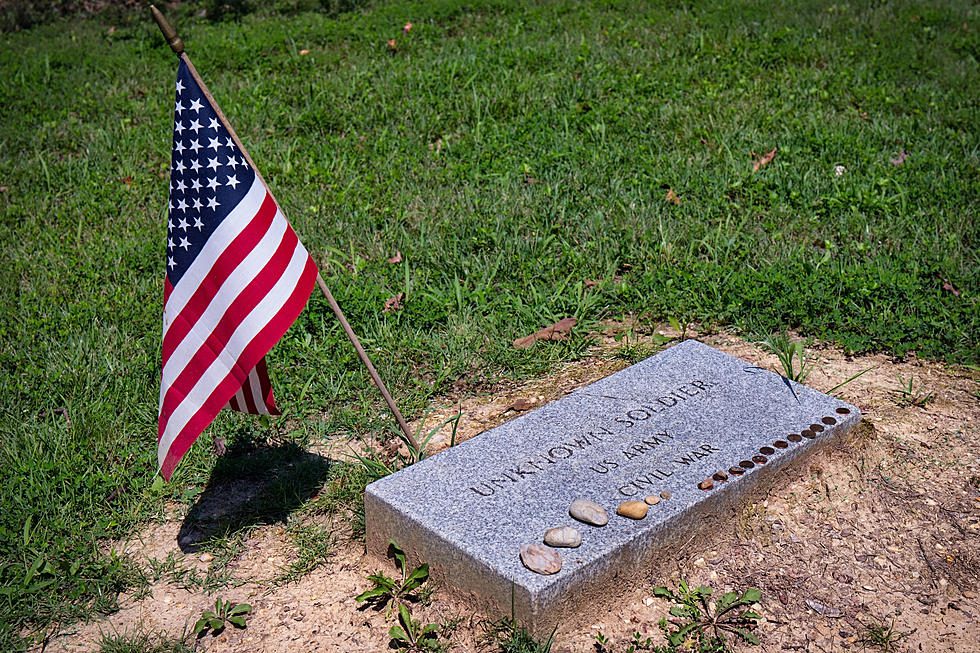
Coins on Nonmilitary Graves
Coins have been used as a currency for centuries on gravestones. Leaving a coin on a headstone is a way of saying that the person who is buried there is worth something and that they will never be forgotten. Coins on non military graves on a soldier’s grave means simply they had visitors at the cemetery.
Similar to a military grave, it is a way of showing respect for the dead. However, coins on gravestones may also have religious or spiritual significance. For some, it means guaranteeing that the deceased’s soul will be able to pay for their passage into the afterlife. Others believe that the coins will help to protect the body from evil spirits. Some even still believe that the grave money left can help the family members afford burial costs that they often go into debt for when they lose their loved one.
What is the coins on gravestones meaning non military? Here is a simple breakdown of the meaning behind each type of quarter on gravestone non military grave:
- Penny – A penny left on a grave is a sign of remembrance. It symbolizes that the person who left it will never forget the deceased.
- Nickel – A nickel represents hope. Leaving a nickel on a grave means that the departed still has a place in your heart and that you hope to see them again someday.
- Dime – A dime is a symbol of love. It shows that the person who left it cares deeply for the deceased and will always cherish their memory.
- Quarter – A quarter represents honor. Leaving a quarter on a grave is a way of showing respect for the life of the departed.
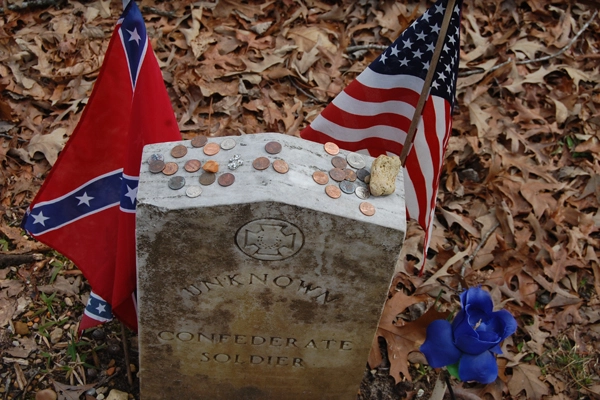
What happens to the coins left on the grave?
They don’t stay around the grave for too long. Instead, these coins are collected by the cemeteries (often military ones) for charitable purposes. For example, they assist in covering the expenses of other veterans’ funerals and cemetery maintenance. One of the reasons for continuing to leave coins is that the visitors to the cemetery site are usually aware that they are supporting these causes in a practical way that also has meaning.
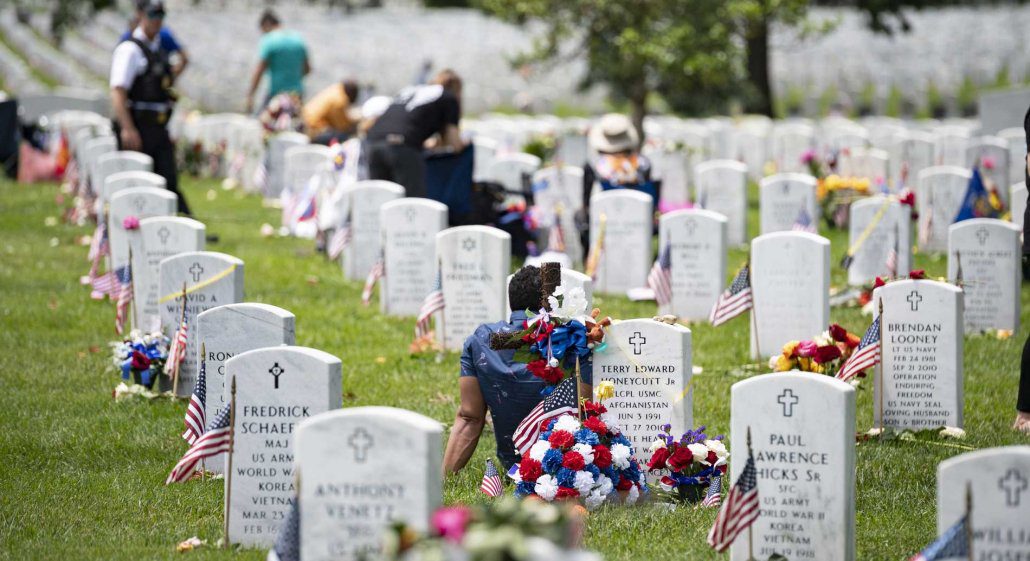
How to Leave Coins on Gravestones Respectfully
1. Choose the coin you would like to leave. The type of coin you leave may have a different meaning. Do some research to see what would be most appropriate.
2. Make sure the coin is clean before placing it on the grave.
3. Place the coin on the grave respectfully and thoughtfully.
4. Say a silent prayer, share a memory of the deceased, or leave a short message, if desired.
5. Leave the grave site quietly and respectfully.
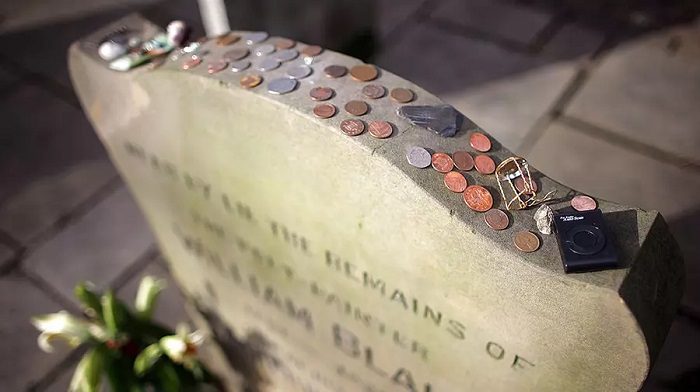
How many coins can be left on a grave?
While no set number of coins can be left on a grave, leaving more than a few is generally considered disrespectful. This is because leaving many coins can also be seen as an attempt to buy favor with the deceased, which is regarded as poor taste. As a result, it is generally best to err on the side of caution and limit the number of coins left on a grave to a few.
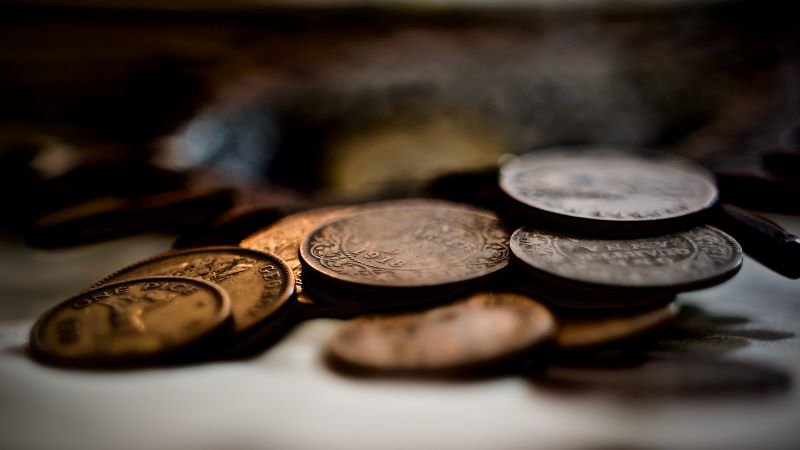
What to Do If You Find Coins Left on a Gravestone
- First, be sure not to remove any coins that have been placed there by others.
- Second, if you do choose to leave a coin, it is generally considered respectful to leave only one coin or no more than a few.
- Finally, be sure to refrain from taking any photos or videos of the coins left on gravestones. By refraining from taking photos or videos, we can show respect for the dead and help to preserve the sanctity of their final resting place.
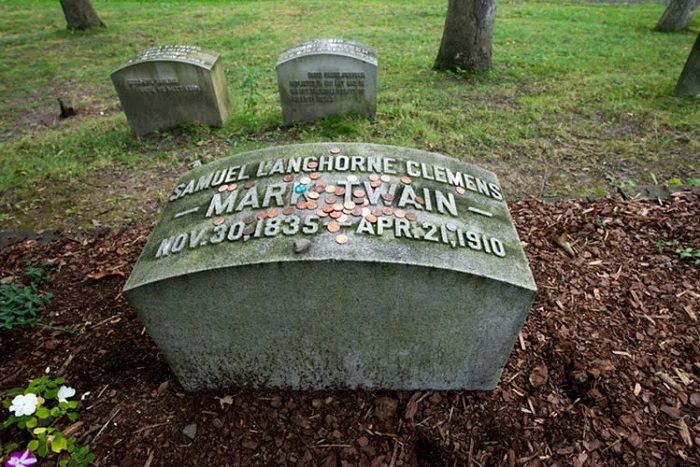
The History Behind the Tradition
As Ancient Greek Myth of Charon and the River Styx
The tradition started with the Ancient Greeks, which tells Charon’s tale. He was the legendary underworld transporter who was said to transfer departed spirits across the River Styx and into the afterlife.
In ancient Greece, coins were put over the deceased’s eyes or mouths as compensation because Charon will demand money to do his service. Therefore, if no one could bribe Charon, passage to the other side of the river was prohibited, and the dead person’s spirit was condemned to wander the river banks for a hundred years.
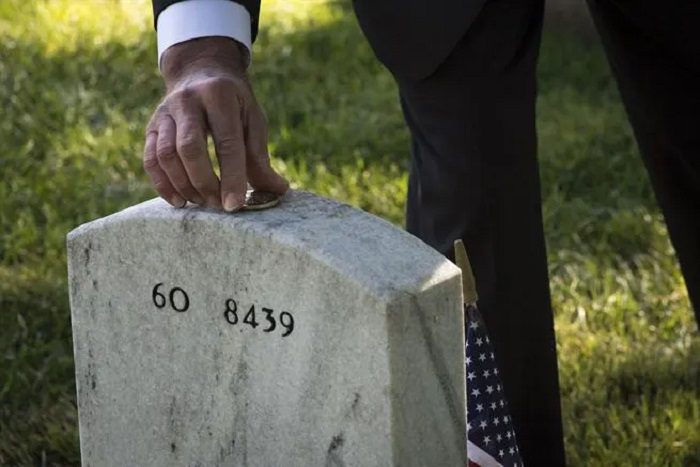
U.S. Military Culture
Coins on military gravestones have a long tradition and have been practiced for centuries. The practice dates back to the Roman Empire, where people would leave coins on the graves of fallen soldiers to honor their memory. The coins also help fund their journey to the afterlife.
In medieval Europe, coins were often placed on graves to respect the deceased. The practice eventually made its way to North America, where it became a popular way of paying tribute to loved ones who had passed away. Today in Western Europe as well as in the U.S., coins on gravestones are seen as a way to remember those who have gone before us in war and to honor their memory.
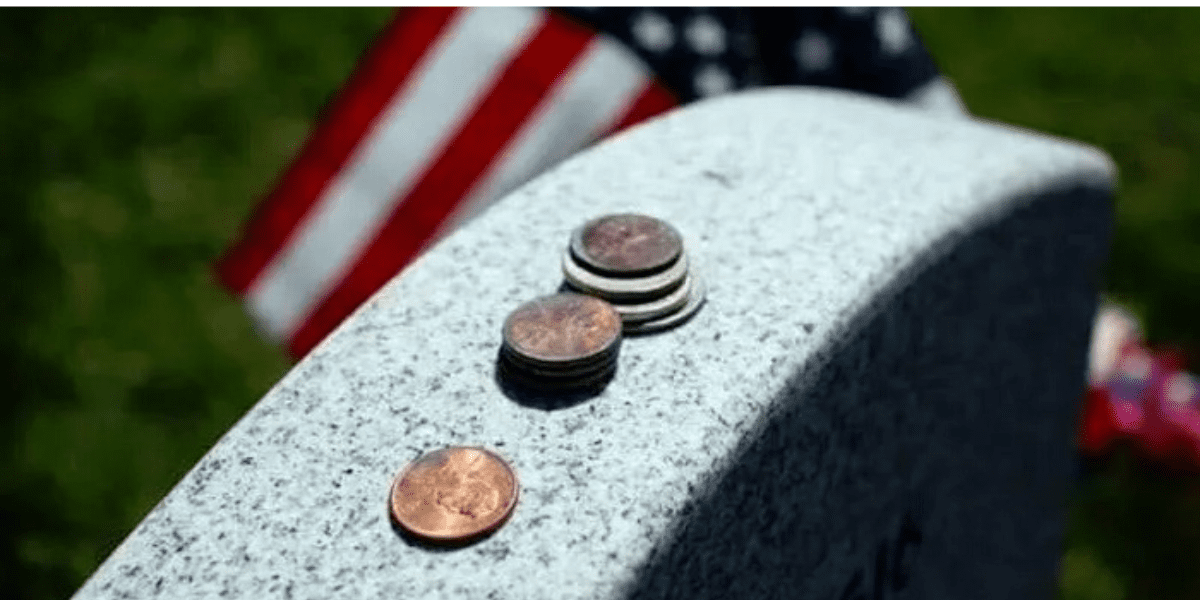
Do all cultures leave coins on graves?
Coins on gravestones are common in many cultures but are not universal. In some cultures, such as China, coins are placed on graves to ward off evil spirits. In others, such as Native American cultures, coins are given to the deceased’s spirit to help them on their journey to the afterlife. Therefore, it is clear that coins on graves are widespread with various meanings and purposes.
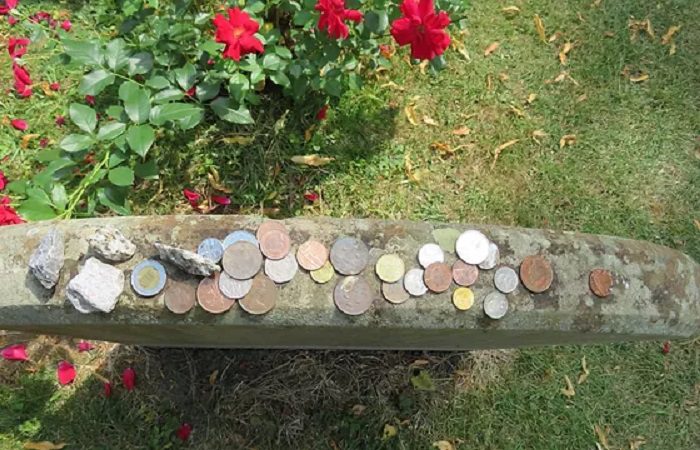
Final Thoughts
Coins on gravestones are a tradition that has been practiced for centuries. The practice is rooted in Ancient Greek mythology and U.S. military culture. Coins are often left on gravestones as a sign of respect for the deceased or as a means of communicating with the dead. Moreover, it is generally considered respectful to leave only one coin or no more than a few. Coins on gravestones are a common practice in many cultures and can be seen as a way to remember those who have gone before us and to honor their memory. There are no politics relating to this in any way, it is a simple gesture of humanity.
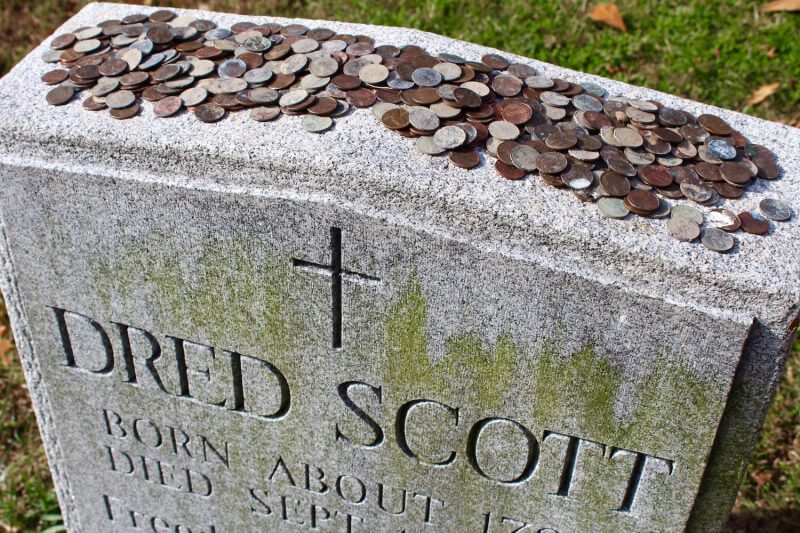
Frequently Asked Questions (FAQs)
What do coins on military tombstones mean?
A coin placed on a gravestone informs the relatives of the fallen soldier that someone has paid their respects. A penny indicates that you have visited. A nickel reveals that you and the fallen soldier had the same boot camp training. You would leave a dime if you served with the soldier. Quarter indicates you were with the deceased when they died.
How long has this tradition been around?
The tradition started with the Ancient Greeks and has been practiced for centuries. It was seen growing in popularity in the U.S. after the Vietnam War, when Vietnam veterans would visit and leave coins if the deceased trained with them at boot camp.
What is the most common coin left on gravestones?
The most common coins left on gravestones are pennies. Pennies represent a visit from the living and are often left by family or friends.
Can coins left on gravestones have more than one meaning?
Yes, coins left on gravestones can have more than one meaning. For example, in the United States, a nickel placed on a gravestone typically means that the person who left it served in the same boot camp as the deceased. Many people would leave Challenge coins for the branch of military they served in, rather than actual monetary coins. Usually only a fellow member of their military branch would possess a challenge coin, though in more recent years, some civilians have had them due to them being passed down by other family members.
Are there any other traditions like coins left on gravestones?
Yes, there are many other traditions, like coins left on gravestones. One popular tradition is flowers. Flowers are often left on gravestones to show respect or as a gift from the living to the deceased.
If you know someone who might like this, please click “Share!”
